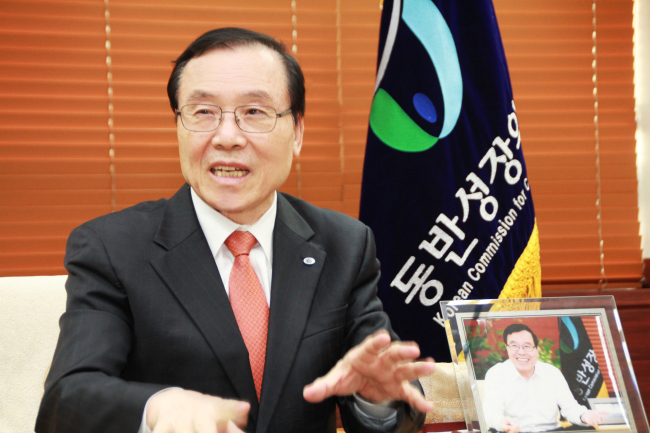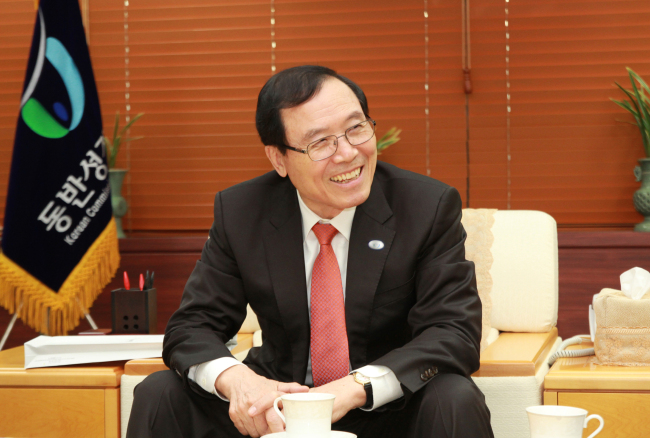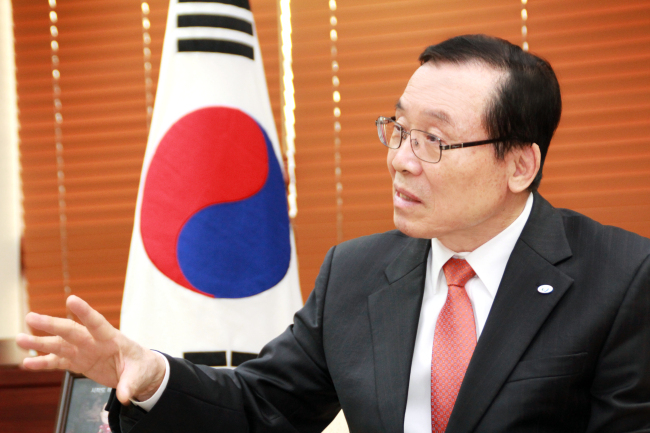Korea’s anticipated membership in the Trans-Pacific Partnership will help the country’s small and medium-sized firms capitalize on overseas markets and will exert pressure on North Korea to open its doors, a respected economist highlighted.
Despite Seoul’s belated decision to join the multinational free trade scheme, announced in mid-October, the mega-sized agreement presents myriad opportunities, encompassing goods and services, rules of origin, trade remedies, government procurement, the environment, labor, pharmacy, sanitation, intellectual property rights and strategies for SMEs, according to Dr. Ahn Choong-yong, chairman of the Korean Commission for Corporate Partnership.
“Our economy enhanced its competitiveness through opening and liberalization at every crucial moment,” Ahn, a 75-year-old distinguished professor at Chung-Ang University, told The Korea Herald last week. “The TPP is a game changer in that it will usher in new trade rules that will qualitatively shift the scope of market liberalization and tariff elimination.”
Despite Seoul’s belated decision to join the multinational free trade scheme, announced in mid-October, the mega-sized agreement presents myriad opportunities, encompassing goods and services, rules of origin, trade remedies, government procurement, the environment, labor, pharmacy, sanitation, intellectual property rights and strategies for SMEs, according to Dr. Ahn Choong-yong, chairman of the Korean Commission for Corporate Partnership.
“Our economy enhanced its competitiveness through opening and liberalization at every crucial moment,” Ahn, a 75-year-old distinguished professor at Chung-Ang University, told The Korea Herald last week. “The TPP is a game changer in that it will usher in new trade rules that will qualitatively shift the scope of market liberalization and tariff elimination.”

The TPP is an accord among twelve Pacific Rim countries ― the U.S., Japan, Canada, Australia, Mexico, New Zealand, Malaysia, Vietnam, Singapore, Brunei, Chile and Peru ― reached on Oct. 5 after seven years of negotiations.
As a new standard for trade, the TPP members have agreed to knock down tariffs on nearly all traded items over the next 30 years. Its overall objectives are to promote economic growth, support the creation and retention of jobs, spur innovation, productivity and competitiveness, raise living standards, reduce poverty and boost transparency, governance, labor and environmental protection.
Spearheaded by the U.S. and Japan to keep China’s rise in check, it is expected to restructure Asia’s regional architecture by closely fastening economy and security dimensions. Analysts have pointed out that the partnership was inseparable from the U.S.’ rebalancing policy, known as the “pivot to Asia.”
Korea has deferred membership, contending that what counts is not participation itself, but timing and conditions. Issues of sensitive domestic agriculture and fierce competition from Japanese carmakers have been raised, along with the free trade agreement with China. For Seoul to join the TPP now, it would face high entry costs, experts say, including consent from all 12 members and being forced to accept its established principles.

The professor said the TPP could act as a conduit for both conglomerates and SMEs to internationalize their operations, as the Korean economy is projected to enter a protracted downturn, stemming from a low birthrate, rising unemployment and rocketing household debt.
“Rather than concentrating only on the saturated local market, our SMEs should open their eyes wider and make efforts to globalize,” Ahn underscored, noting that 85 percent of Korean SMEs focused only on the domestic market.
“China has a vast, multilayered and variegated market of 1.3 billion consumers. Using the concept of inclusive growth, our KCCP helps SMEs internationalize by facilitating cooperation with corporations.”
He emphasized that his organization supported overseas marketing and business launches, joint venture schemes with local companies and infiltrating the regional value chain. Strategies for helping SMEs are enshrined in one of the TPP’s 30 chapters.
“One of the most important aspects of the TPP is that trade and investment must go together,” he underlined, adding that the proposed free trade agreement between the European Union and the United States ― the Transatlantic Trade and Investment Partnership ― deliberately has the word “investment” in its title.
The chairman claimed: “Investment creates jobs. It also invigorates the regional value chains, assigning diverse functions to different locations for competitive advantages. The TPP will propel investment through public-private partnerships between countries, and investor-state disputes will escalate.”

Furthermore, unlike bilateral FTAs, which often lead to a “spaghetti bowl effect” ― in which multiple FTAs lead to complications and contradictions in applying domestic rules of origin, as the same commodity is subjected to different tariffs ― the TPP’s cumulative rules of origin and uniform local content ratios minimize these concerns.
As Korea is not a member, the textiles, intermediary goods and auto part industries are expected to lose ground against TPP members benefitting from tax exemptions.
Regarding the sensitive agriculture and related food industries, Ahn said that a basic capacity for domestic production must be safeguarded for food security, to hedge against volatile global supply. However, he stressed, we should not merely try to protect the industry, but cultivate high-quality produce and innovative research and development.
“By infusing the latest food science with our gastronomical sensibilities, we can sell our products as delectable, pollution-free, organic food to China and Southeast Asia.”
In regard to wider regional security, the TPP, along with the Regional Comprehensive Economic Partnership, would generate further incentives for North Korea to enter the global value chain, the scholar argued, into which virtually all Asian economies would be integrated.
The RCEP is a proposed FTA between the 10 member states of the Association of Southeast Asian Nations ― Brunei, Myanmar, Cambodia, Indonesia, Laos, Malaysia, the Philippines, Singapore, Thailand and Vietnam ― and the six states with which the ASEAN has existing FTAs ― Australia, China, India, Japan, South Korea and New Zealand. The RCEP is largely driven by China and ASEAN as a competing alternative to the TPP.
“TPP can induce market-oriented changes in North Korea,” he reiterated. Echoing expert views that the market has largely replaced state distribution in North Korea, Ahn indicated that Pyongyang had sought hard to attract foreign investment through special economic zones and tourism.
“Recently, Pyongyang has even publicized measures for handling investor-state disputes,” he noted. “Our unification efforts should encourage North Korea to open its economy. The more the communist regime and people get a taste of prosperity, the closer our unification will come.”
By Joel Lee (joel@heraldcorp.com)
-
Articles by Korea Herald




![[Herald Interview] 'Amid aging population, Korea to invite more young professionals from overseas'](http://res.heraldm.com/phpwas/restmb_idxmake.php?idx=644&simg=/content/image/2024/04/24/20240424050844_0.jpg&u=20240424200058)













![[KH Explains] Korean shipbuilding stocks rally: Real growth or bubble?](http://res.heraldm.com/phpwas/restmb_idxmake.php?idx=652&simg=/content/image/2024/04/25/20240425050656_0.jpg&u=)

